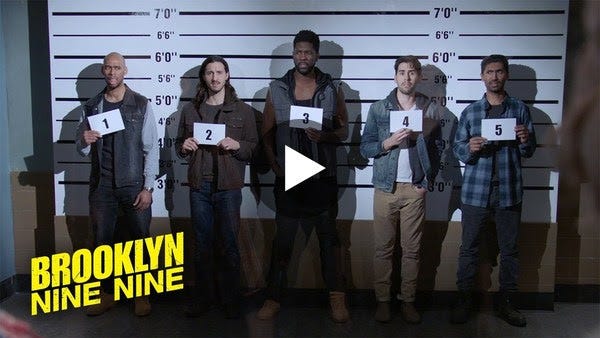The Lectio Letter - Issue #18 - Real learning is not safe
An authentic spirituality of education will address the fear that so often permeates and destroys teaching and learning. It will understand that fear, not ignorance, is the enemy of learning, and that fear is what gives ignorance its power… To teach is to create a space in which obedience to truth is practiced. – Parker Palmer
Welcome to Issue #18 of the Lectio Letter. This (normally) members-only newsletter is filled with music, film and food suggestions, links, and at least one original article by me every two weeks (I confess, this one is a little late).
The vast swathe of the dear subscribers receiving this newsletter missed out on the last 2 months of members-only editions which you can read now if you become a member here.
They’ve been on “How I taught a dog to catch and he taught me to love”, “Heaven is great..but it’s not the end of the world” and “A call to depth through engaging the teriffying T Word, Theology!”
If you think this or any previous articles would be interesting or useful to those you know, please feel free to forward this email.
As a subscriber you get access to all previous articles even if you only just signed up recently, there is a list at the bottom of this email.
Real learning isn't safe...
Last year in November, we enthusiastically engaged a room filled with bright young faces excited about the pioneering possibilities of a formation and education programme we had written called Teleios. Now, a year further on, the twists and turns of COVID have significantly ravaged our original intentions. Despite this, I look back on what grace allowed us to pull off over the internet (with both its horrors and miracles), and I am grateful.
As I write this, we now find ourselves busily preparing for the first in-person classroom context we will have been in since then. Included in this is investigating our obligations to the physical well-being of the gathered students and staff, which will likely require full scale mask-wearing, hand sanitising and social distancing. This has become par for the course in our COVID-impacted times, and has led me to consider how we might facilitate true learning in such an environment as this.
And is it even possible?
I trust it is possible, and I am of the unshakeable conviction that true learning requires community: a gathered people who are not primarily interested in out-thinking or out-smarting one another (as our competition-crazed education systems have taught us to do), but are learning to think together in order to live well together.
As Christians, all our activities are ordered around the two greatest commandments:
Love the Lord your God with all your heart and with all your soul and with all your mind. This is the first and greatest commandment. And the second is like it: Love your neighbour as yourself (Luke 10:27).
For those of us who claim the name of Christ, every endeavour we embark on is hopefully ordered towards these ends. Couched within this Christian narrative and conviction, learning is about growing in the love of God and in the love of neighbour.
The commandments threefold orientation gives us a good framework and trajectory for understanding how love forms us heart, soul and mind. Regarding our hearts, Christian love forms our affections and teaches us to be lovers of God and others. Understood in Christian terms, our soul is not, as the Greeks would have it, the most important part of us. It is the seat of our being, and can be understood as the place that grounds our dignity as image-bearers. It is the holism of personhood and the place where our habits and virtues accumulate and form us for better or worse. Our minds are for the type of knowledge that animates our communication and self-understanding. This love that has captured us is meant to be shared and to be given away. It is news that needs to be heard (and then experienced), as good. The Christian call is not only to foster an individual (and interior) experience of love but to proclaim it from the rooftops in persuasive and winsome words.
Tom Bloomer calls all education a power encounter. It is considered as such because education has a strong formation role in our lives. We were made for love and we become what we love. Consequently, the things we love (our loves) direct our lives. Therefore, because education can tend to direct us towards unlovable things (often things that can’t love us back), we have to consistently examine the loves that our hearts, minds and souls are being trained towards.
Ben Myers describes a classroom that would train our loves in this way when he says:
“It’s a place where people come together and start to learn something. Then, sometimes, they start to love what they are learning, and they are changed by that love.”
Anyone who has felt it, or been caught up in it, can attest that love is grace. Real love cannot be fabricated, but appears like a gift, like a fortunate fall. We make ourselves available to love and we orient ourselves to be captured by it, but it necessarily comes from a place beyond ourselves. Similarly, in a classroom/learning and formation space, all we can do is position ourselves to slow down, to pay attention, and to receive love. We seek to have the wounds caused by fear healed. And we seek to set aside the lazy objections and prejudices that have bound us in unthinking comfort zones.
Once again, Ben Myers gives us an inroad into what real learning is:
“Real learning…is a kind of miracle. It is a gentle, delicate, interior process by which the soul comes into contact with something beyond itself and reaches out to it in love.”
So we discover and begin to experience that learning is gentle and delicate as is the way of love.
Paradoxically, however, to evoke the Narnian account of Aslan, the way of love is not safe but it is good.
In more recent times, it has become popular to cultivate Christian places as areas of safety. I agree that a greater attentiveness to the dignity of one another and the importance of recognising that learning can only take place in a trust-filled environment is good and desirable. However, one of my concerns around this cultivation of safe places is that we conflate safety with individually construed standards of comfort and offence-taking. If Tom Bloomer is right when he suggests that education is a power encounter, then the reality is that we are engaged at the centre of the battle between good and evil, love and fear, right and wrong.
And that is not a safe place to be.
When we embark on a quest for learning and education, we step onto a battlefield. This is a contested place and the stakes are high. Good education (including in the classroom) makes space for each person to experience a measure of safety that allows for one’s partially formed reflections to come forth.
However, if all we do is feel safe, we will not learn.
There is a kind of forcefulness in the advancing of God’s rule and reign, and it begins within us. It is an uninvited “violence” and “offensiveness” that attacks our dearly-held convictions and perspectives of the world. And we need this. Scripture’s analogies indicate a radical in-breaking from the outside: blind eyes can now see and those who have died are being raised again…and these things propel us right out of our comfort zones.
This is a radical and uncomfortable transformation.
In Mere Christianity, C.S Lewis addresses this type of transformation when he says:
“Imagine yourself as a living house. God comes in to rebuild that house. At first, perhaps, you can understand what He is doing. He is getting the drains right and stopping the leaks in the roof and so on; you knew that those jobs needed doing and so you are not surprised. But presently He starts knocking the house about in a way that hurts abominably and does not seem to make any sense. What on earth is He up to? The explanation is that He is building quite a different house from the one you thought of - throwing out a new wing here, putting on an extra floor there, running up towers, making courtyards. You thought you were being made into a decent little cottage: but He is building a palace. He intends to come and live in it Himself.”
Real learning is a transforming power encounter with Love Himself. As Lewis puts it, the change required “hurts abominably,” and this is the very change that Christian discipleship aims for. It is the long process of becoming more acutely aware of the way our dearly held beliefs and perceptions have blinded us. When this uncomfortable awareness takes hold, our eyes begin to see the “true light, who gives light to everyone" (John 1:9).
As it’s goal, Christian learning embraces the risk-taking adventure of knowing the God who isn’t safe but who is very good. It is within this community of God’s image-bearers (where our cracked-clay lives may not be considered a “safe” learning environment), that we begin to embark on this grand adventure together.
As the second letter to the Corinthians reminds us, we have a treasure within these jars of clay, and although learning together may have an element of unsafety, it can be increasingly wonderful and good…and absolutely necessary for learning and growth.
Status Board
Work: As you are receiving this we are embarking on day one of the M.A. Intensive here in Cape Town. Lots of effort has gone into to co-ordinating all three locations and then figuring out what can only take place ‘in the room’ so to speak, especially when 'the room’ includes students joining on zoom. It’s lots of work, but as ever, we feel deeply privileged to work alongside gifted and servant-hearted people while we serve participants who serve in China, Nepal, India, and South Africa and long to see God’s Kingdom come in those places.
Music: I recently discovered Tommy Guerrero via Shazaming some background instrumental music. It’s upbeat but relaxed enough to keep in the background. As I’ve mentioned before, I can only work with instrumental music as lyrics distract me too much. If you are similar then enjoy..
Tommy Guerrero - Road to Knowhere [Full Album]
Viewing: We have been re-watching Season 6 of Brooklyn Nine Nine… It’s great stuff, here is one the best scenes of all time
I Want It That Way | Brooklyn Nine-Nine
Miscellaneous Link List
In recent weeks our extended community lost a mother and wife to cancer
It has led me to reflect on how difficult it is to navigate death and how we find it even more difficult in our death-denying, sunnyside up culture. I’ll share a few resources here that might be worth saving for a time when you need them.
David Kinnaman from the Barna Group recently lost his wife to a long battle with cancer and posted this poem
“Let us agree
for now
that we will not say
the breaking
makes us stronger
or that it is better
to have this pain
than to have done
without this love.
Let us promise
we will not
tell ourselves
time will heal
the wound,
when every day
our waking
opens it anew.
Perhaps for now
it can be enough
to simply marvel
at the mystery
of how a heart
so broken
can go on beating,
as if it were made
for precisely this—
as if it knows
the only cure for love
is more of it,
as if it sees
the heart’s sole remedy
for breaking
is to love still,
as if it trusts
that its own
persistent pulse
is the rhythm
of a blessing
we cannot
begin to fathom
but will save us
nonetheless.”
—Jan Richardson, A Blessing for the Brokenhearted
Father John Behr, a British Eastern Orthodox Priest who studied under Kallistos Ware and went on to serve at St Vladamir’s in the US is now at Aberdeen University. Here he reflects on “facing up to death”
Facing Up to Death || John Behr | RESET
A liturgy for those who mourn
Some times we need words for things that leave us speechless..
Leader: Lord, we hold space for and mourn with those who have lost loved ones during the pandemic. We grieve that their lives, their love, their presence, and their contributions that were cut short because of the pandemic. Help us honor the ways they cared for us and loved us into being. We are grateful for their love and light; may their love become a legacy that encourages us through dark nights and cloudy days, may their love surround us and bring us comfort, reminding us that we are not alone.
ALL: God, comfort us, save us, redeem us, heal us, forgive us, and liberate us.
Leader: Lord, we lament our inability to collectively grieve the loss of so many loved ones because of the pandemic. We grieve that all we are left with is our anger, frustration, and our deep sorrow.
ALL: God, comfort us, save us, redeem us, heal us, forgive us, and liberate us.
Who can translate women?
Despite Jesus keeping company with a band of female followers who served and bank rolled his ministry, Christianity has a very potted history, at certains time being a “city on a hill” then at others worse than the culture it surrounds. NT scholar Scot McKnight features the few places where our bible translations trip us up on issues related to women.
Those of us outside the US can’t help cast a mistrustful sideways glance at this election season
This may be the best biblical ‘voting’ advice available;
“Do not put your trust in princes, in human beings, who cannot save (Psa. 146:3).“
Tom Hollands discovers Christianity under the surface of his cultural liberalism
High Profiles featured a fascinating in-depth interview with history writer Tom Holland about his intellectual journey;
I think I am naturally conservative. I think I’m more moved by things that have been than things that might be. I feel the power of what’s happening now as something that is rooted in the past.
So, essentially, what has happened is that I have lost my faith, and my faith was liberalism. I just don’t think it has any secure foundations at all. As Western power retreats, we’ve come to realise that these values that [we] had assumed were universal — human rights, the inherent dignity of Man, the obligation of the rich to the poor — are actually very culturally contingent. Our assumption that there are universal values is itself very culturally contingent — and specifically Christian, I think. I can find no basis for believing in any of this stuff at all that does not involve a conscious leap of faith.
I also feel that the legacy of Christian writings, of Christian experience, of Christian activism, of all the things about Christianity that stir and move me, [is] richer than anything that my secular liberal assumptions have to offer. I find it rich and beautiful and exciting in a way that as a child I found the Romans rich and beautiful and exciting. […]
Sometimes I think: This is just a fascinating cultural expression of something that’s been going on for hundreds of years. And then there are other times when I think: This is the key to why I think the way I do. Perhaps I just need to stop overthinking it.
Maybe I should just ‘surrender to the Spirit’. One of the things that really struck me writing Dominion was the vast [impact] that the idea of the Spirit has had — the idea that you can read something and suddenly the Spirit enables you to see things afresh, the idea of this fire that blazes and spreads across the world. There’s this tension between head and heart, between thought and Spirit.
Play is a serious Business
Even from the very brief examination of play, we should draw at least two important conclusions. First, playing with children is perhaps as important for their maturation as taking them to church on Sunday. Parents who do not play with their children deprive them of an essential ingredient of maturity. Man cannot live on bread alone. A child does not grow on bread alone. Two, if we could only be as serious about everyday life as we are serious about play and games, the world would become a much better place, much closer to the heavenly blueprint. Perhaps this is one of the reasons why God gives us children, so that we can play with them and re-learn the importance of rules, patience, endurance, order, and delayed gratification.
That’s all for now…
Liam



![Tommy Guerrero - Road to Knowhere [Full Album] Tommy Guerrero - Road to Knowhere [Full Album]](https://substackcdn.com/image/fetch/$s_!cVVh!,w_1456,c_limit,f_auto,q_auto:good,fl_progressive:steep/https%3A%2F%2Fbucketeer-e05bbc84-baa3-437e-9518-adb32be77984.s3.amazonaws.com%2Fpublic%2Fimages%2F5c693e5a-c79c-4e3c-94f1-4034ba9c50c9_600x450.jpeg)


